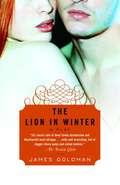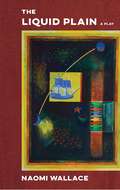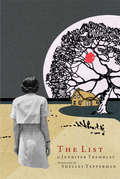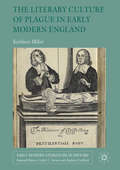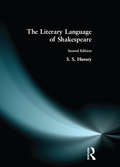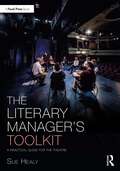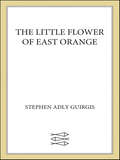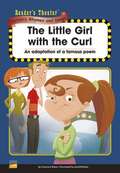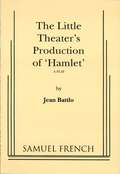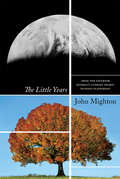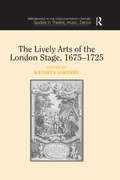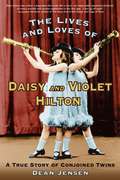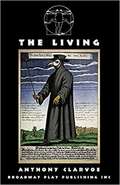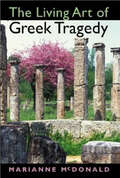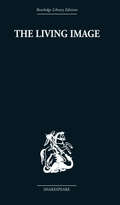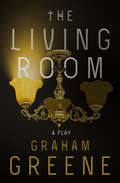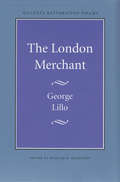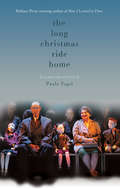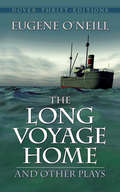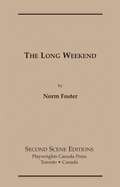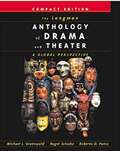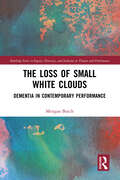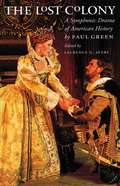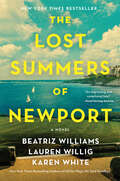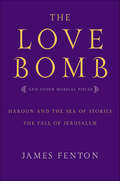- Table View
- List View
The Lion in Winter: A Play
by James E. GoldmanThis superior drama charts a doomed love triangle backwards through time. More than a study in style this astonishing story is a passionate, mysterious play about memory, illusion and love.
The Liquid Plain (TCG Edition)
by Naomi Wallace"American theater needs more plays like Naomi Wallace's The Liquid Plain--by which I mean works that are historical, epic and poetic, that valorize the lives of the poor and oppressed."--Time Out New YorkOn the docks of late eighteenth-century Rhode Island, two runaway slaves find love and a near-drowned man. With a motley band of sailors, they plan a desperate and daring run to freedom. As the mysteries of their identities come to light, painful truths about the past and present collide and flow into the next generation. Acclaimed playwright Naomi Wallace's newest work brings to life a group of people whose stories have been erased from history. Told with lyricism and power, The Liquid Plain was awarded the 2012 Horton Foote Prize for Promising New American Play. This sweeping historical saga has enjoyed acclaimed runs at Oregon Shakespeare Festival and the Signature Theatre in New York.Naomi Wallace is a playwright from Kentucky. Her plays, which have been produced in the United Kingdom, Europe, the United States, and the Middle East, include In the Heart of America, Slaughter City, One Flea Spare, The Trestle at Pope Lick Creek, Things of Dry Hours, The Fever Chart: Three Visions of the Middle East, And I and Silence, The Hard Weather Boating Party , and The Liquid Plain. Awards include the Susan Smith Blackburn Prize (twice), Joseph Kesselring Prize, Fellowship of Southern Writers Drama Award, Obie Award, Horton Foote Award for Most Promising New American Play, MacArthur Fellowship, and the inaugural Windham Campbell Prize for Drama.
The List
by Jennifer Tremblay Shelley TeppermanShe keeps a tight list and doesn't let anything go unchecked, except for one important misplaced item: a favour to her neighbour. With this broken promise, a series of events unfolds that lead to her friend's death. Was the death preventable had the task been completed? A Governor General's Literary Award–winning play, The List is the riveting story of a woman haunted by internal regret when she fails to critically prioritize her world.
The Literary Culture of Plague in Early Modern England
by Kathleen MillerThis book is about the literary culture that emerged during and in the aftermath of the Great Plague of London (1665). Textual transmission impacted upon and simultaneously was impacted by the events of the plague. This book examines the role of print and manuscript cultures on representations of the disease through micro-histories and case studies of writing from that time, interpreting the place of these media and the construction of authorship during the outbreak. The macabre history of plague in early modern England largely ended with the Great Plague of London, and the miscellany of plague writings that responded to the epidemic forms the subject of this book.
The Literary Language of Shakespeare
by S.S. HusseyProfessor Hussey looks at the vocabulary, syntax and register of Renaissance English, following this with a more detailed analysis of particular kinds of language in the plays such as prose, verse, rhetoric and the soliloquy. For this new edition, the text has been revised throughout with, in particular, a completely new chapter providing detailed readings of selected plays, illustrating the ways particular aspects of language can be studied in practice.
The Literary Manager's Toolkit: A Practical Guide for the Theatre (The Focal Press Toolkit Series)
by Sue HealyThe Literary Manager’s Toolkit is a clear and comprehensive guide to the role of the literary manager in theatre and beyond, focusing on the key skills, networks, and processes that underpin a successful career in this and associated roles. This book outlines the tasks and responsibilities of a literary manager in the selection, development, and production of new plays. In the first part, it outlines the how, when, and why of the literary manager’s main activities, equipping the reader with everything that they will need when approaching this role’s central challenges. The second part provides a selection of practical, accessible, and easy-to-follow materials and workshop suggestions for literary managers who will work with playwrights as they develop their creative writing and dramaturgy skills. This is the go-to resource for the working professional literary manager or dramaturg, and for students on dramaturgy courses in theatre degree programmes.
The Little Flower of East Orange: A Play
by Stephen Adly GuirgisWhen Therese Marie arrives in the emergency room of a small hospital in the Bronx, suffering from hypothermia and in shock, no one there knows her story. To the doctors and nurses, she is just another abandoned elderly woman who can't even tell them her name. But Therese Marie's dementia is not all that it seems. And when her prodigal son, Danny, returns to New York, Therese Marie must fight to maintain her dignity in light of her son's insistence on confronting the ugly secrets of their past.In this unconventional family drama, Stephen Adly Guirgis gives us a mother and son who must face a long family legacy of abuse in order to find the true meaning of grace.
The Little Girl with the Curl: An adaptation of a famous poem
by Jeffrey B. Fuerst Gerald Kelley Francisco BlaneSally was a good little girl sometimes, and not-so-good at other times.
The Little Theatre Production of "Hamlet"
by Jean BattloComedy / 2m, 6f / Interior / A sophisticated New York director with a successful Off Broadway season under her belt reluctantly travels to West Virginia to direct Hamlet under the auspices of a grant for "under served regions." Only six people show up to audition: 23 year old Mona who has always dreamed of playing Ophelia, a coal truck driver whose single desire is Mona, two waitresses in their forties who have never been stage struck, 74 year old Hattie Johnson who has spearheaded the effort to see Mona get a crack at her dream, and the bank vice president who has been ordered to appear. Gathering in Hattie's Restaurant, this group perpetrates the most harrowing production of Shakespeare ever mounted. Some amazing costumes and merry mishaps ladle hilarity on top of sincere attempts to tailor Hamlet to this remarkable cast. The play is the thing, and though limp in quality, the production marches forward in tune to very real and deep human spirits bent on accomplishment. The result, a fractured, quixotic play, provides a fine example of realizing the impossible dream.
The Little Years
by John MightonKate possesses the makings of a gifted mathematician with an enthusiasm for exploring the mysteries of space and time. But this is the 1950s and women are routinely laughed out of scientific circles. Besides, every family has its star, and Kate's brother already holds that distinction. Hindered by prejudices against women, Kate is confined to a life of unfulfilling jobs, leading her to become bitter and unhappy. The Little Years confronts the impact of chauvinism and explores the nature of fame, the value of art, and the passing of time.
The Lively Arts of the London Stage, 1675–1725 (Performance in the Long Eighteenth Century: Studies in Theatre, Music, Dance)
by Kathryn LowerreUnlike collections of essays which focus on a single century or whose authors are drawn from a single discipline, this collection reflects the myriad performance options available to London audiences, offering readers a composite portrait of the music, drama, and dance productions that characterized this rich period. Just as the performing arts were deeply interrelated, the essays presented here, by scholars from a range of fields, engage in dialogue with others in the volume. The opening section examines a famous series of 1701 performances based on the competition between composers to set William Congreve's masque The Judgment of Paris to music. The essays in the central section (the 'mainpiece') showcase performers and productions on the London stage from a variety of perspectives, including English 'tastes' in art and music, the use of dance, the depiction of madness and masculinity in both spoken and musical performances, and genres and modes in the context of contemporary criticism and theatrical practice. A brief afterpiece looks at comic pieces in relation to satire, parody and homage. By bringing together work by scholars of music, dance, and drama, this cross-disciplinary collection illuminates the interconnecting strands that shaped a vibrant theatrical world.
The Lives and Loves of Daisy and Violet Hilton: A True Story of Conjoined Twins
by Dean JensenTHE LIVES AND LOVES OF DAISY AND VIOLET HILTON follows the poignant life story of twin sisters who were literally joined at the hip, set against the tumultuous backdrop of America during the first half of the 20th century. Daisy and Violet and an unforgettable cast of show-business characters come alive on the pages of this carefully researched and sensitively written biography.Reviews"Jensen'¬?s book is a testament to the fickleness of the entertainment world."-Tampa Bay Tribune"It is an affecting story, gently and honestly told without frills, without sensation. In Jensen'¬?s hands, the twins are always human, individuals, never freaks joined at the hips as the world saw them after their birth in 1908. . . Here, their story is pure."-Milwaukee Journal SentinelFrom the Trade Paperback edition.
The Living
by Anthony Clarvoe“Beautifully written… There is light of understanding cast on the human condition in this play. That light concerns the simple heroism of people who do not abandon their fellows in the dark hours.”Marilynne S. Mason, Christian Science Monitor “Set in London as the Black Plague sweeps the city claiming more than 100,000 lives, THE LIVING is not about death. Rather this remarkable, riveting drama is a compelling confirmation of life.” Sandra Dillard-Rosen, The Denver Post “Fascinating… THE LIVING is a play both clever and thoughtful…. With a fine wit and a keen irony.”Richard Christiansen, Chicago Tribune “Haunting revives the plague time with often chilling vividness… The drama would be interesting even if there were no modern parallel. The play remains intellectually engrossing and, ultimately, gut-wrenchingly affecting.”Aileen Jacobson, Newsday “This intelligent and cumulatively affecting drama…discovers the hope and humanity shining inside the black shroud.”Steven Winn, San Francisco Chronicle “Aided by Clarvoe’s enticing dialogue and grim humor…we see that beneath all the turmoil and death, there exists a simple humanity that saves souls and restores faith.”Mary Houlihan-Skilton, Chicago Sun-Times “A rich, dynamic play…laced with oddly beautiful metaphors for tragedy…. Do heed this reminder to keep breathing during the full force of the action.”Patricia Corrigan, St Louis Post-Dispatch “As much a drama of ideas as it is a drama of passion and compassion, it unfolds in a series of Shakespeare-like scenes that follow a handful of characters through the darkest months of the plague.… Clarvoe writes with wit and intelligence.“Marion Garmel, Indianapolis Star “As a tale of human heroism and cowardice, pitilessness and compassion, medical sleuthing and political expediency, it cannot be beat…. Clarvoe’s most potent idea has been to prohibit the characters from touching one another. Not even a piece of paper is handed directly from one person to another; everything is arranged to prevent human contact. So the ending is really miraculous.” Judith Green, San Jose Mercury News
The Living Art of Greek Tragedy
by Marianne McdonaldMarianne McDonald brings together her training as a scholar of classical Greek with her vast experience in theatre and drama to help students of the classics and of theatre learn about the living performance tradition of Greek tragedy. The Living Art of Greek Tragedy is indispensable for anyone interested in performing Greek drama, and McDonald's engaging descriptions offer the necessary background to all those who desire to know more about the ancient world. With a chapter on each of the three major Greek tragedians (Aeschylus, Sophocles, and Euripides), McDonald provides a balance of textual analysis, practical knowledge of the theatre, and an experienced look at the difficulties and accomplishments of theatrical performances. She shows how ancient Greek tragedy, long a part of the standard repertoire of theatre companies throughout the world, remains fresh and alive for contemporary audiences.
The Living Image: Shakespearean Essays
by T. R. HennFirst published in 1972. The imagery of field sports - of hawking, hunting, shooting and fishing - and the associated imagery of warfare are a striking feature in Shakespeare's plays. The Living Image examines the nature of this imagery, considering it first in the light of the practices and techniques of Elizabethan field sports and weaponry and then its broader metaphoric significance in relation to the themes of the plays. The contemporary associations of the imagery - the inferences of female sexuality and waywardness from hawking imagery, for example, and the ideals of nobility and courage attached to images of hunting and war are all discussed.
The Living Room: A Play
by Graham GreeneThe illicit affair of a devout woman in London ignites a shattering family crisis in the author’s “ruthlessly honest” first play (The Guardian). In a dour Holland Park house with rooms and secrets long shuttered live three unyielding forces for morality: rigidly religious sisters Helen and Teresa, and their brother, a Roman Catholic priest. Into the lives of this insular trio comes their young grandniece, Rose Pemberton, following the death of her mother. To the mortification of her aunts, Rose has also brought her lover, Michael Dennis, who is twenty-five years Rose’s senior, married, and a psychology lecturer dictated by reason, not faith. In a home that reeks of sanctimony, Rose and Michael are as welcome as sin. But it’s the arrival of Michael’s distraught wife—armed with righteous emotional blackmail and worse—that ignites an unexpected fury and makes real the family’s greatest fears. Premiering in London in 1953 and moving to Broadway one year later, Graham Greene’s debut as a dramatist was hailed by Kenneth Tynan as “the best first play of its generation.”
The London Merchant: Or, The History Of George Barnwell. As It Is Acted At The Theatre-royal In Drury-lane. By His Majesty's Servants. By Mr. Lillo. T
by George Lillo William H. McBurneyMrs. Millwood is beautiful, intelligent, and ambitious, but London gives her no means of support except to seduce men. Love for her leads eighteen-year-old Barnwell to deceit, theft, and murder."What are your laws," Mrs. Millwood asks, "but the fool’s wisdom and the coward’s valor, the instrument and screen of all your villainies by which you punish in others what you act out yourselves, had you been in their circumstances? The judge who condemns the poor man for being a thief had been a thief himself, had he been poor. Thus you go on deceiving and being deceived, harassing, plaguing, and destroying one another, but women are your universal prey."First performed in 1731, The London Merchant became on of the most popular plays of the century. A chronicler of the age, Theophilus Cibber called it "almost a new species of tragedy."
The Long Christmas Ride Home
by Paula Vogel"Brilliant . . . even more ambitious than Vogel's How I Learned to Drive . . . it covers more ground and is bolder in its storytelling. Vogel's language is at its most poetic, eloquent and elegiac. In fact, its vivid imagery rivals the prose style of any great American short story writer. The play sounds like it might have been adapted from a beautiful, undiscovered novella."--New Haven Register"One of the most absorbing evenings of theatre to come along in some time."--VarietyPast and present collide on a snowy Christmas Eve for a troubled family of five. Humorous and heart-wrenching, this beautifully written play proves that magic can be found in the simplest breaths of life. Combining the elements of No theatre and Bunraku with contemporary Western sensibilities, Vogel's Ride is a mesmerizing homage to the works of Thornton Wilder, including Our Town. A moving and memorable study of the American family careening near the edge of oblivion.Paula Vogel's plays include The Baltimore Waltz, Mineola Twins, Hot 'n' Throbbing, Desdemona, And Baby Makes Seven, among others. Ms. Vogel will be the resident playwright during the Signature Theatre's 2004-05 season dedicated to her works. She has taught at Brown University in the MFA playwriting program since 1985.
The Long Voyage Home and Other Plays (Dover Thrift Editions)
by Eugene O'NeillPlaywright Eugene O'Neill (1888-1953) spent his early years as a merchant seaman and drifter on the waterfronts of New York, Liverpool, and Buenos Aires. From these experiences came the inspiration and subject matter for four of his finest short plays, collected in this volume.Written between 1913 and 1917 and considered to have made O'Neill's reputation, the plays comprise a tetralogy, all concerning the same ship, the S.S. Glencairn. The plays are Bound East for Cardiff, In the Zone, The Long Voyage Home, and The Moon of the Caribbees. These realistically presented melodramas depict moody, intense, and fascinating characters entrapped by larger forces, usually represented by the sea. This edition, which offers all four plays in a single inexpensive volume, provides a splendid introduction to the work of an important modern dramatist.
The Long Weekend: Three Plays - Maggie's Getting Married / Here On The Flight Path / The Long Weekend
by Norm FosterThe truth and lies of a friendship come to the surface during a weekend visit between two couples. There are plenty of surprises along the way in this comedy of manners. "...just enough sex, just enough smart talk, just enough preposterous plot twists to keep you titillated." —Gary Smith, Hamilton Spectator
The Longman Anthology of Drama and Theater: A Global Perspective, Compact Edition
by Roger Schultz Michael Greenwald Roberto PomoThe Longman Anthology of Drama and Theater, Compact Edition, is a fully-integrated text/anthology of drama with a global emphasis for the Introduction to Drama course. <p><p> The Compact Edition is divided into three parts. Part One examines the roots of theater and the theoretical and critical foundations of theater and drama. Part Two, an anthology of Western Theater, and Part Three, an anthology of non-western theater, are divided into historical and geographical sections, each preceded by a brief overview of the cultural and historical context that shaped the plays. A map and timeline of key historical, cultural, and artistic events precedes each section in Parts II and III. <p><p> Preceding each section of plays is a brief overview of the history of the theater from its origins in Europe, Asia, Africa, and the Americas to the present. The ideas that inspired the dramas are considered, as well as the particulars of each performance. In the interest of creating a clean, uncluttered text, selected bibliographies are at the end of the book. <p><p> Questions for Discussion and Writing are included in the accompanying Instructor's Manual, as well as more thorough bibliographies and a comprehensive list of films and videos that illustrate the ideas in the text.
The Loss of Small White Clouds: Dementia in Contemporary Performance (Routledge Series in Equity, Diversity, and Inclusion in Theatre and Performance)
by Morgan BatchThis volume seeks to instigate a discussion about dementia in theatre. The discussions in this book borrow from the literature on dementia’s representation in other artforms, while reflecting on theatre’s unique capacity to incorporate multiple artforms in a live context (hypermediacy). The author examines constructions of diegesis and the use of various performance tools, including physical theatre, puppetry, and postdramatic performance. She discusses stage representations of interior experiences of dementia; selfhood in dementia; the demarcation of those with dementia from those without; endings, erasure, and the pursuit of catharsis; placelessness and disruptions of traditional dramatic constructions of time; and ultimately, performances creatively led by people with dementia. The book traces patterns of narrativisation on the stage—including common dramaturgical forms, settings, and character relationships—as well as examples that transcend mainstream representation. This book is important reading for theatre and performance students, scholars, and practitioners, as well as cultural studies writers engaged in research about narratives of dementia.
The Lost Colony
by Paul GreenIn 1937, The Lost Colony, Paul Green's dramatic retelling of the founding and mysterious disappearance of the Roanoke Island colony, opened to standing-room-only audiences and rave reviews. Since then, the beloved outdoor drama has played to more than 3 million people, and it is still going strong. Produced by the Roanoke Island Historical Association at the Waterside Theater near Manteo, North Carolina, The Lost Colony has run for more than sixty summers almost without interruption. (Production was suspended during World War II, when the threat of German submarines prowling the coast made an extended blackout necessary.)The model for modern outdoor theater, The Lost Colony combines song, dance, drama, special effects, and music to breathe life into shadowy legend. This rendering of the play's text, edited and with an introduction by Laurence Avery, brings this pioneering work back into print.
The Lost Summers of Newport: A Novel
by Karen White Lauren Willig Beatriz WilliamsTHE NEW YORK TIMES BESTSELLER"An engrossing and sumptuous tale, this novel is a fantastic spring read." — Good Morning AmericaFrom the New York Times bestselling team of Beatriz Williams, Lauren Willig, and Karen White—a novel of money and secrets set among the famous summer mansions of Newport, Rhode Island, spanning over a century from the Gilded Age to the present day.“Three stories elegantly intertwine in this clever and stylish tale of murder and family lies…This crackerjack novel offers three mysteries for the price of one.” —Publishers Weekly (starred review)2019: Andie Figuero has just landed her dream job as a producer of Mansion Makeover, a popular reality show about restoring America’s most lavish historic houses. Andie has high hopes for her latest project: the once glorious but gently crumbling Sprague Hall in Newport, Rhode Island, summer resort of America’s gilded class—famous for the lavish “summer cottages” of Vanderbilts and Belmonts. But Andie runs into trouble: the reclusive heiress who still lives in the mansion, Lucia “Lucky” Sprague, will only allow the show to go forward on two conditions: One, nobody speaks to her. Two, nobody touches the mansion’s ruined boathouse.1899: Ellen Daniels has been hired to give singing lessons to Miss Maybelle Sprague, a naive young Colorado mining heiress whose stepbrother John has poured their new money into buying a place among Newport’s elite. John is determined to see Maybelle married off to a fortune-hunting Italian prince, and Ellen is supposed to polish up the girl for her launch into society. But the deceptively demure Ellen has her own checkered past, and she’s hiding in plain sight at Sprague Hall.1958: Lucia “Lucky” Sprague has always felt like an outsider at Sprague Hall. When she and her grandmother—the American-born Princess di Conti—fled Mussolini’s Italy, it seemed natural to go back to the imposing Newport house Nana owned but hadn’t seen since her marriage in 1899. Over the years, Lucky's lost her Italian accent and found a place for herself among the yachting set by marrying Stuyvesant Sprague, the alcoholic scion of her Sprague stepfamily. But one fateful night in the mansion’s old boathouse will uncover a devastating truth...and change everything she thought she knew about her past.As the cameras roll on Mansion Makeover, the house begins to yield up the dark secrets the Spragues thought would stay hidden forever….
The Love Bomb: And Other Musical Pieces
by James FentonThree Libretti—Ranging In Setting From Ancient Jerusalem To Pre-Apocalyptic London—From An Acclaimed PoetThis volume of libretti marks new work—and new terrain—for James Fenton. Commissioned by companies in New York and England, these musical pieces make the most of the poet's poignant, witty, and characteristically lyrical verse. Whether evoking modern-day London on the edge of apocalypse in The Love Bomb, a timeless land beyond the moon in this version of Salman Rushdie's children's novel Haroun and the Sea of Stories, or ancient Jerusalem in his stirring oratorio The Fall of Jerusalem, which was composed to mark the millennium, Fenton's lucid storytelling and stylish wordplay bring these pieces vividly to life—with equal power in performance or on the page.Haroun and the Sea of Stories was commissioned by the New York City Opera and had its premiere at Lincoln Center in September 2003."[James Fenton] writes as no one else dares to--with clarity, wit, and the simplest of rhymes."--Voice Literary Supplement
